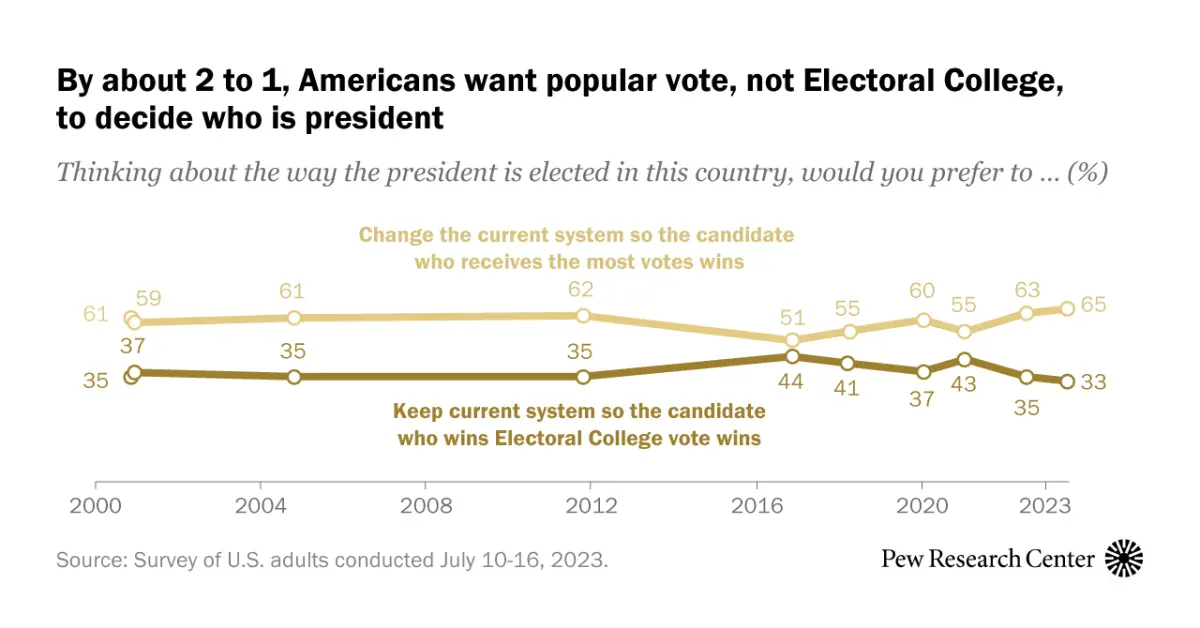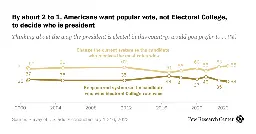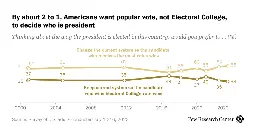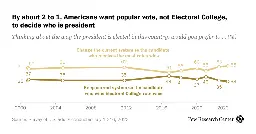Majority of Americans continue to favor moving away from Electoral College
Majority of Americans continue to favor moving away from Electoral College

Majority of Americans continue to favor moving away from Electoral College

65% of U.S. adults say the way the president is elected should be changed so that the winner of the popular vote nationwide wins the presidency.



It'd be nice to go beyond and have some sort of ranked voting while we're at it. Essentially being forced to pick between two parties or risk having your vote being wasted sucks.
I don't know how the american system works, but voting for small parties should not considered a wasted vote. It helps the party even if they don't get elected
It's worse than wasted. It's effectively a half-vote for the major candidate you like the least.
If a party receives 5% of the popular vote, they start to receive funding from the FEC. That hasn't happened in a while for a third party.
Not in America. In America it's an utter waste. The elections are too close.
Unpopular opinion: ranked choice voting will do little to solve the USA's democracy issues.
For starters, there are plenty of countries that do use FPTP and still have plenty of third parties in their parliaments (Canada, UK, Taiwan, Australia off the top of my head). So FPTP does not inherently preclude third parties - rather, the USA simply doesn't have any culture of multilateralism. I'd say this is mostly a byproduct of various cultural phenomena - the wealth gap, corporate media ownership, private campaign financing, win-or-lose mindset, etc.
But the greater issue is that RCV doesn't really ensure proportionality. As long as you have a single winner from each district, there will be distortions between the proportion of parties for whom people vote and the ultimate parliamentary body. For example, even if you implemented RCV across the entire USA today, I'm pretty sure most legislative bodies would still be entirely dominated by a single party because of gerrymandering and single-member districts.
So if you want to fix the USA's core issue, what you really need is a more proportional system - either have fewer, larger districts with multiple representatives from each one, or adopt something like MMP which is what Germany has (where you also cast a party vote to declare your preference for which party you most want represented in parliament and distribute proportionally along this tally across all voters). Not only does this make the final representation more fair, but it also does a much better job of making all votes matter, instead of only the lucky few in swing states or the rare competitive Congressional race.
But RCV on its own won't do much. It is still a small improvement, and if you have the opportunity to adopt it, I say go for it. But at best, I think it would take decades, or maybe even generations, before it starts to improve things.
Also, while I know this doesn't pertain quite so much to Presidential elections as the electoral college is used for, the USA is also fairly unique in that it has a directly elected head of government with much more power than other countries that also have a directly elected head of state. This is also a part of the problem - the executive branch is supposed to be the weakest of the 3 Federal branches - but it's a discussion for another time.
Canada and UK third parties are still smaller parties, they have no possiblity of electing a head of state.
I contest your usage of Canada as an example. While it's certainly not as polarized as the US, the effects of FPTP are still prominent. There's a ton of vote splitting at the federal and provincial levels. Eg, conservatives rule Ontario despite the majority of people voting for one of the two left-er leaning parties, since the two parties basically split the left vote down the middle, while conservatives only have one party.
I do completely agree that propositional voting is waaaaay better than ranked choice, though. Personally, I will take almost anything over FPTP, but some form of PR is vastly superior, as you noted.
But at least with ranked choice, people can start to vote for another party without it feeling like a penalty. As a Canadian, I basically have to vote strategic. I don't get to vote for my favourite party because of FPTP. Ranked choice would at least remove that issue.
I think the two party system of the US is basically where FPTP systems are all at risk to end up, especially since voting strategically gradually results in that. But the US GOP is so crazy that it's almost a necessity for any progressive to vote strategically, whereas at least in Canada, things aren't quite as bad, which makes it easier for people to take the risk of voting for who they really want to.
Look at third parties and their success in the UK and Canada.
The last general election in the UK was 2019. Conservatives got 43.6% of the vote but 56.2% of the seats. Labor got 32.1% of the votes and 31.1% of the seats.
The biggest national third party, the Liberal Democrats, got 11.6% of the vote but a mere 1.7% of the seats.
In comparison, look at regional third parties. The Scottish National Party got 3.9% of the vote and a whopping 7.4% of the seats. Irish regional parties like Sinn Feinn and the Democratic Unionist Party got a combined 2.3% of the seats with a combined 1.4% of the seats.
Previous elections have been quite similar. In 2015, the far right UKIP won only a single seat after getting a whopping 12.6% of the vote.
Canada is quite similar. The Bloc Quebecois consistently gets more votes than the national New Democratic Party, despite having gotten less than half as many votes.
For anyone living in Utah, a bill to enable Ranked Choice voting will be in November 2023.
So anyone there please register to vote sooner rather than later.
Currently people are being told it's too confusing and too liberal, so they really could be more young people votes to help the cause.
RCV is a rebrand of the voting method IRV, which was used by many cities in the early 20th century. Due to inconsistent results, it was repealed. So, unfortunately, conservatives have a leg to stand on when they attack RCV.
For clarity: their specific attacks take things to the extreme and often have some racist underpinnings, but there is a kernel of truth to attacking specifically on the method itself.
That is why I support something like STAR voting, it doesn't suffer from many of RCV's issues
I wish your ballot measure luck however, because at the end of the day it still is, mildly better than FPTP
Not "while we're at it" - RCV is the real change we need.
Approval/STAR would be even better, but I'd take RCV over FPTP
RCV will do nothing to break the duopoly in America. RCV will basically allow you to vote for the Democrats or Republicans without bubbling their name on your ballot.
Contrary to what is stated, RCV falls apart as soon as more than 2 parties become viable. It suffers from the spoiler effect.
RCV, like plurality voting, only reflects your preference for one candidate at a time. In fact, it's relatively accurate to say that RCV is just plurality with (literally) extra steps (rounds).
One of the better ballot changes we can make is to move to something like STAR voting, which can capture the nuance of magnitude of preference for ALL candidates at once.
However, changing voting method alone is not enough. Proportional representation and expanding the number of elected officials are two powerful ways to introduce new ideas and break up power structures.
And, of course, campaign finance reform such as democracy vouchers
I prefer score ballots over ranked ballots, expressing magnitude of preference is important!
Ranked choice specifically is one of the worst ranked ballot options out there and I hope we can push for something else
Isnt that what ranked choice is? Expressing magnitude by ranking your choices?
Let's just cut out the middleman and go straight to direct voting.
Vote directly on the issues that matter to you. Representative democracies only exist to protect the ruling class.
Ranked choice still doesn't solve the winner-takes-all situation that is the presidential election. Instead it should be appointed by a group of competent people, who in turn are voted in by something like ranked choice or whatever.
The original intent from the Constitution was that the winner was president and the second place was vice president. Since the vice president also is the tie breaking vote in the Senate, that doesn't sit very well with the president. So they changed it to the running mate system.
The group your talking about would essentially be the cabinet? Right? They get approved by Congress. So indirect approval by the people.